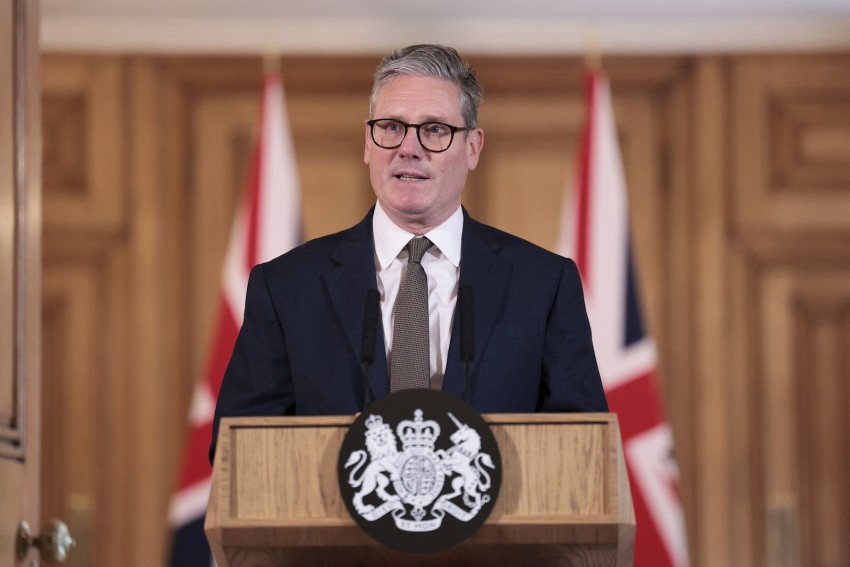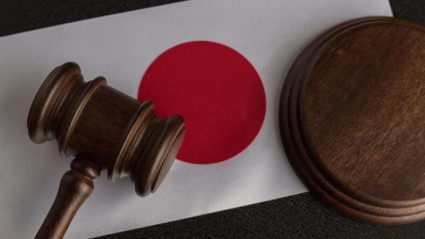The new British prime minister, Keir Starmer, this week faces his first test on the global stage.
Having presided over a landslide victory for his party on July 4, Starmer will head to Washington, D.C., for a crucial NATO summit starting Tuesday. Days later he will host over 50 European leaders for the European Political Community meeting.
Amid many global challenges, Starmer has an opportunity to show that the U.K. is back on the world stage. In particular, with many Western leaders facing serious headwinds at home – think Emmanuel Macron in France or Olaf Scholz in Germany – Starmer has a chance to re-establish the U.K. as the key partner for the U.S. in Europe.
Partnership with the U.S. is a priority for the new U.K. government. The so-called “special relationship” has been strained in recent years, notably by Brexit – the British decision to exit the European Union – which reduced U.K. influence in Europe and put the peace agreement in Northern Ireland at risk. That latter point was particularly grating for President Joe Biden, who is of Irish descent.
But translating a U.K. desire for more engagement into influence on U.S. policy will be a real challenge for Starmer. To be successful, he’ll need to navigate a number of thorny issues, including U.S. electoral politics, wars in Ukraine and Gaza, the perceived threat of China and a reset with the EU. In all of these cases, addressing existing differences between London and Washington will not be straightforward.
Waiting for another election
An unavoidable fact for Starmer as he embarks on building a relationship with Washington is that he doesn’t know who he will be dealing with for the bulk of his term.
For the first time since 1992, the U.K. general election took place a mere few months before a presidential election across the Atlantic.
This could stall any significant investment in the transatlantic relationship until American voters have spoken in November.
On the surface, Starmer’s left-leaning Labour Party might welcome a Democratic win in November. Besides not having to deal with a presidential transition, the two parties are more aligned philosophically; and Starmer has expressed his admiration for the presumed Democratic candidate President Joe Biden.
Similarly, David Lammy, the U.K. government’s likely foreign secretary, has openly disparaged Republican Donald Trump in the past, referring to him as a “woman-hating, neo-Nazi-sympathizing sociopath” and a “profound threat to the international order.”
Yet, the vitality of the relationship between prime minister and president has often hinged more on personalities than mere ideological affinity. While Labour’s Tony Blair and conservative George W. Bush worked well together, this was hardly the case for Donald Trump and Theresa May – both of whom led the establishment right-wing parties in their countries.
It remains to be seen how Starmer would fare with either of the presumed U.S. presidential contenders. But he will finally get his chance to test the waters with Biden at the NATO summit, after failing to secure a meeting with the president while leader of the U.K. opposition. Lammy, for his part, has been steadily nurturing ties with the MAGA-sphere in case of a Trump win.
Ukraine and defense
Beyond personalities, the fate of the “special relationship” will also depend on whether both sides can converge on some tricky issues.
The U.K. has been at the forefront of supporting Ukraine since Russia launched its full-scale invasion in 2022. Beyond providing advanced weapons and training Ukrainian pilots, the U.K. government also signed a security pact with Kyiv in January. Starmer is not expected to deviate from that line.
Yet, that commitment may do little to shift the U.S. on some crucial questions regarding the war. Despite the U.K. actively pushing for NATO membership for Ukraine, the Biden administration is not ready to budge on that issue at this time. And if Trump were to win in November, defense spending could prove yet again a bone of contention. NATO allies are pushing to raise defense spending to 2.5% of gross domestic product – but Labour would have to balance that goal against competing domestic priorities such as improving the country’s cherished National Health Service and addressing a cost-of-living crisis.
Gaza tightrope
Perhaps an even trickier issue for the new prime minister to reconcile with his counterpart in the White House will be the issue of Gaza.
After taking over as party leader in 2020, Starmer worked tirelessly to undo the legacy of his predecessor, the hard-left and very pro-Palestinian Jeremy Corbyn. This included going out of his way to undo the public perception of Labour as being antisemitic.
But Starmer’s more pro-Israel stance in the aftermath of the Oct. 7 attacks has alienated some of Labour’s traditional voters.
And the pivot hasn’t meant that Labour’s position on Gaza isn’t at times out of step with the White House. In particular, neither Starmer nor Lammy have condemned the International Criminal Court’s hope to seek an arrest warrant for leaders of both Israel and Hamas. Biden, for his part, called this ICC move “outrageous.”
Pressure on China
China will be another very delicate test of friendship with Washington for the new U.K. government. Lammy has promised that Labour will launch a complete audit of the country’s policy toward China to determine “where we will need to compete, where we can cooperate and where we will need to challenge.”
Such an audit could help address internal divisions in the Labour Party, which is torn between supporters of better relations with Beijing and those who see it as a security threat.
But the audit could be even more crucial considering the likely pressures the U.K. will face from Washington, where members of both parties strongly support geopolitical competition with Beijing. The U.K. and U.S. already have areas of disagreement when it comes to China, such as over welcoming Chinese electric vehicles production or whether Beijing has committed a genocide in Xinjiang.
Ultimately, as foreign policy analyst Sophia Gaston put it, “The big question for Labour is whether it believes that strategic competition is a U.S.-China story, or whether it’s something that Britain has a role to play in.”
Resetting EU relations
Finally, the strength of the special relationship will also come down to how well Labour can manage its planned reset with the EU.
Building closer ties with its European counterparts could strengthen the U.K.’s influence, and it could serve as a hedging strategy in case Trump wins and takes the U.S. in a more isolationist direction.
Yet Labour shouldn’t automatically assume it’ll find receptive partners in Europe. The scars of the Brexit negotiations, the rise of the far-right in Europe and the major crises in Ukraine and the Middle East might limit European bandwidth to dedicate much effort in building ties with the new Labour government.
Starmer and his government will have an opportunity to repair the special relationship with the U.S. – but the path ahead will likely be anything but smooth. American electoral politics, and misalignment over any number of thorny challenges, could easily knock the new prime minister off course. What’s more, the fragile state of the U.K. economy will severely limit what the new government can do in foreign policy. It also means that, at least at first, Starmer will likely focus on issues at home, not abroad.
Garret Martin is Senior Professorial Lecturer, Co-Director Transatlantic Policy Center, American University School of International Service.
The Conversation is an independent and nonprofit source of news, analysis and commentary from academic experts.
© The Conversation














12 Comments
Login to comment
GuruMick
Could'nt read past the phrase "special relationship "
Toxic relationship more like it.
TaiwanIsNotChina
The UK has no more useful allies than the US.
GuruMick
Withdraw all the "military special relationships " and proceed from there.
Both nations are as militaristic as the other and a pox on both their houses.
Apart from that what can one say but "God Save the King "
UK and USA are fading powers anyway.
GuruMick
The US has a "special relationship " with France too....where breaking news reveal a win for the Left/Green alliance.
That makes me "h h h happy "
Everyone claims a "special relationship " with the US....like a "friend with benefits " type of arrangement.
Is this why the world is screwed ?
Pukey2
The US does not have allies. It has interests.
And what did Kissinger say about being an 'ally' of America?
TaiwanIsNotChina
We have an awful lot of interests that show up and put their lives on the line when it counts then.
Kissinger was an idiot but I can see how you would still like for him to get that mausoleum in Peking.
TaiwanIsNotChina
The UK is under no obligation to go quietly just to please you.
That should make you happy: Putinists remain relegated to shouting on message boards.
Everyone gets the benefits, that is right.
We're screwed because certain other powers continue to not know their place.
GuruMick
Taiwan..."not know their place " eh ?
Where do we kow tow ,?
And poor dead US soldiers are not protecting "freedom "
Protecting US "interests "...usually oil or political leverage.
Yes, Virginia, there is a ruling class. I think it was Eisenhower who first spoke of the danger of the US Military Industrial Comple.
bass4funk
Yes, no more establishments cronies, that’s a good thing.
deanzaZZR
I don't expect any change other than some rhetorical flourishes. The UK is completely under Uncle Sam's thumb.
Ramsey's Kitchen
We're screwed because certain other powers continue to not know their place.
Which other powers and where exactly is their place?
TaiwanIsNotChina
Russia, regional power with 1991 borders. China, super power but not infringing on SK, Japan, Taiwan, the Philippines.